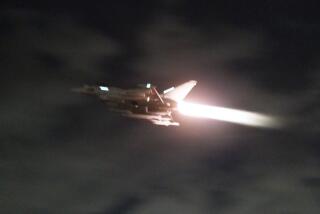U.S. Warns Muslims Against Taking Advantage of Strikes : Balkans: America must persuade Serbs to end Gorazde siege without encouraging their foes to intensify bid for lost land.
- Share via
WASHINGTON — President Clinton on Tuesday warned Muslims in Bosnia-Herzegovina against trying to take advantage of the allied air strikes outside the city of Gorazde by intensifying their fight against the Bosnian Serbs, saying both sides must now go back to the peace table.
“We have cautioned the Bosnian government forces not to try to take advantage of this and violate the understandings themselves,” Clinton told reporters here. The State Department issued a similar statement later, urging all sides to resume negotiations.
The President made his remarks in response to earlier reports that the Muslim-led Bosnian government had resumed its shelling of the Bosnian Serbs--apparently to provoke them into firing their artillery and thus risking further NATO air strikes. Serbian batteries were quiet Tuesday.
The unusual American warning to the Bosnian government reflected a major dilemma in the Clinton Administration’s current strategy: how to persuade the Serbs to end their siege of the mostly Muslim city of Gorazde without simultaneously encouraging their foes to step up their bid to regain lost territory.
At the same time, Clinton left open the possibility that the North Atlantic Treaty Organization might broaden its air attacks to the five other U.N. “safe haven” cities besides Gorazde, where the last two days’ air strikes have taken place. “I wouldn’t rule anything out,” he said.
Madeleine Albright, the U.S. ambassador to the United Nations, had suggested Monday that the model used by NATO in Gorazde could be applied to the other U.N. safe zones as well. At the least, she said, it should “be seen as a signal for the other safe havens.”
But officials indicated that the Administration still is split over whether the arrangement used in Gorazde should be extended to other cities. Although the State Department has been willing to widen the military operation in Bosnia, the Pentagon has been opposed.
It was unclear how serious a problem the Bosnian government’s new aggressiveness ultimately will prove to be for the peace process, or whether Bosnian Serb gunners will remain silent today or resume shelling, as their leaders threatened during Tuesday’s hiatus.
George Kenney, an analyst at the Carnegie Endowment for International Peace, said that the dilemma posed by the Bosnian government is “potentially a really serious problem,” particularly since Washington has refused to spell out what terms it wants the Muslims to accept.
“It’s not enough to say, ‘Let’s go back to the table,’ ” Kenney said in a telephone interview. “If we’re serious about an outcome, we’ll have to tell everyone involved that we want them to accept something they don’t like. And that includes the Muslims as well.”
The developments came as the Administration continued to try to smooth over earlier protests by the Russians that they had not been consulted before NATO launched its air strikes on Sunday.
Clinton said he was “very encouraged” that the Russians had resumed pressing the Bosnian Serbs to withdraw from Gorazde. He said he had assured Russian President Boris N. Yeltsin that Washington has no interest in using NATO’s air power to affect the outcome of the war.
The State Department disclosed that Secretary of State Warren Christopher spoke by telephone with Russian Foreign Minister Andrei V. Kozyrev on Tuesday to make a similar point.
Yeltsin himself once again stopped short of condemning the NATO air strikes--though he did say, on a visit to Spain on Tuesday, that the air action may have dampened Moscow’s enthusiasm for joining NATO’s Partnership for Peace program.
Even so, the bristling in Moscow continued, as Russian lawmakers denounced the air strikes and the Foreign Ministry said that Russia “will never put up with the role of a so-called junior partner who is informed only after the fact.”
Analysts said that the issue might well heat up in Russia today when the Duma, the lower house of Parliament, is expected to discuss the situation. Some factions already have drawn up a draft resolution accusing the United States of fanning the conflict.
At the same time, the White House won bipartisan backing for its current policy in Bosnia as congressional leaders of both parties--summoned by Clinton for a private briefing--told reporters that they support the U.S. actions there.
Rep. Newt Gingrich (R-Ga.), the House minority whip, said that there is “overwhelming support” for using U.S.-led air strikes to support U.N. ground forces around Gorazde if the Bosnian Serbs continue to shell the city in the face of international pressure.
House Minority Leader Robert H. Michel (R-Ill.) echoed Clinton’s warning to the Bosnian government, saying that he hopes it “would not be provoking these incidents that we hear about.” He said American policy in the region is to press both sides to resume peace talks.
The Pentagon said Tuesday that more reports showed only one explosion from the four conventional, 500-pound Mark-82 gravity bombs that U.S. Marine F/A-18 warplanes targeted on Bosnian Serb forces Monday.
Kathleen deLaski, Defense Department spokeswoman, said two of the bombs did not go off when they hit the ground and a third jammed on the wing-carriage of one of the jets and could not be released.
The Pentagon had said previously the raid destroyed a tank and several armored vehicles. It said Tuesday no tank had been hit.
U.S. officials said such problems with bombs can occur. But deLaski said that authorities are examining the bombs stored at Aviano, Italy, where the F/A-18s are based, to be sure they are in order. Bombs released in a similar raid on Sunday all exploded.
Times staff writer Carey Goldberg in Moscow contributed to this report.
More to Read
Sign up for Essential California
The most important California stories and recommendations in your inbox every morning.
You may occasionally receive promotional content from the Los Angeles Times.













